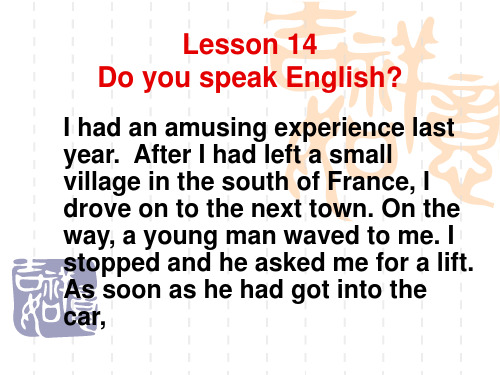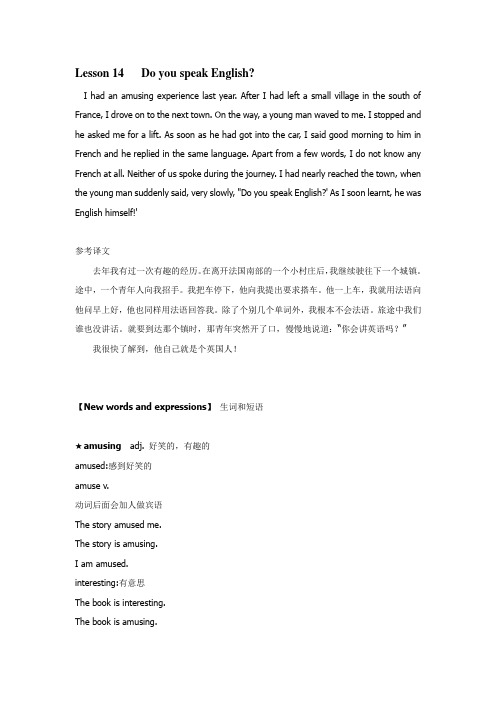新概念英语第二册第14课课文讲解
新概念英语第二册第14课

新概念英语第二册第14课新概念英语二是难度适中,很适合学习的一册,在这里主要展示原文与笔记,接下来一起学习第十四课吧。
Lesson 14 Do you speak English?课文内容:I had an amusing experience last year. After I had left a small village in the south of France, I drove on to the next town. On the way, a young man waved to me. I stopped and he asked me for a lift. As soon as he had got into the car, I said good morning to him in French and he replied in the same language. Apart from a few words, I do not know any French at all. Neither of us spoke during the journey. I had nearly reached the town, when the young man suddenly said, very slowly, ‘Do you speak English?' As I soon learnt, he was English himself.精讲笔记:4.I stopped and he asked me for a lift.我停下了车,他请求让我捎他一段路。
语言点1 对比学习:1)I stopped the car.我停下了车。
(强调我的动作,文中省去the car。
)2)The car stopped.车子停了。
(强调车的动作。
)语言点2 ask sb.for sth.向某人请求某事:ask me for a lift向我请求搭便车;A beggar asked me for money when I was walking on the street last night.昨晚我在街上闲逛时,一个乞丐向我要钱。
新概念第二册第14课

三、精讲课文 1、I had an amusing experience last year. amusing = interesting = funny 有趣 的,引人发笑的。be amused 被逗笑 的。 experience ① 经验:不可数名词。 He has a lot of experience. experience ② 经历:可数名词。 He has a lot of experiences.
2、in the south of France = in South France 在法国南部。 drive on to... 继续驶往… 3、On the way, a young man waved to me. on the/one’s way (to some place) 在 去某地的途中。 wave to sb. 向某人挥手。例如:I waved goodbye to her.
6、Apart from a few words, I do not know any French at all. apart from = except for 除了…之外。 例句:I had a good time apart from the weather. not...at all 根本不。例句:I’m not hungry at all.
7、Neither of us spoke during the journey. neither of 两个都不。either of 这个 或那个。both of 两个都。during 在…期间。 journey [’dʒə:ni]n.旅行,行程 vi.旅 行
8、I had nearly reached the town, when the young man suddenly said, very slowly, 'Do yБайду номын сангаасu speak English?' 过去完成时。 nearly 几乎,接近。 suddenly 突然地。 slowly 缓慢地。
(完整版)新概念第二册第14课课文讲解.doc

Lesson 14 Do you speak English?I had an amusing experience last year. After I had left a small village in the south of France, I drove on to the next town. On the way, a young man waved to me. I stopped andhe asked me for a lift. As soon as he had got into the car, I said good morning to him in French and he replied in the same language. Apart from a few words, I do not know anyFrench at all. Neither of us spoke during the journey. I had nearly reached the town, whenthe young man suddenly said, very slowly, "Do you speak English?' As I soon learnt, hewas English himself!'参考译文去年我有过一次有趣的经历。
在离开法国南部的一个小村庄后,我继续驶往下一个城镇。
途中,一个青年人向我招手。
我把车停下,他向我提出要求搭车。
他一上车,我就用法语向他问早上好,他也同样用法语回答我。
除了个别几个单词外,我根本不会法语。
旅途中我们谁也没讲话。
就要到达那个镇时,那青年突然开了口,慢慢地说道:“你会讲英语吗?”我很快了解到,他自己就是个英国人!【New words and expressions】生词和短语★amusing adj.好笑的,有趣的amused: 感到好笑的amuse v.动词后面会加人做宾语The story amused me.The story is amusing.I am amused.interesting: 有意思The book is interesting.The book is amusing.funny: 好笑的,可以指,开心的,令人开心的interesting/funny story★experience n.、体:不可数名、感受:可数名He has a lot of experience. He has a lot of experiences.Experience is the best teacher .是最好的老。
新概念第二册第14课讲义超详细

Lesson 14 Do you speak English?【New words and expressions】生词和短语amusing adj. 好笑的,有趣的experience n. 经历wavev. 招手liftn. 搭便车reply v. 回答language n. 语言journey n. 旅行★amusing adj. 好笑的, 有趣的The story is amusing. (好笑的)amused adj. 感到好笑的(要笑出声)I am amused.amuse v. 使发笑,使愉快The story amused me.funny adj. 好笑的(不一定要笑出声可以指贬义),开心的,令人开心的interesting / funny story★experience n. 经历(可数);经验(不可数)①n. 经历(可数)He has a lot of experiences.②n. 经验,体验(不可数)They want someone with a lot of experience for this job.Does she have any experience in teaching?③vt. 经验,体验Have you ever experienced anything like this?The village has experienced great changes since 1980.experienced adj. 有经验的,经验丰富的He is an experienced doctor.★wave v. 招手vt. & vi. (使)波动,(使)起伏,(使)飘扬n.波浪,波纹,波①v. 招手vt. & vi. (使)波动,(使)起伏,(使)飘扬Bill waved his hand to us and then drove away.比尔向我们挥手告别后开车走了。
新概念英语第二册lesson14Do you speak English

★reply v. 回答 reply与answer的区别: ① answer作为不及物动词是一样的 : He answered/replied. ② answer作为及物动词就不一样了 : answer sth. answer the letter 回信 reply to sth. I will reply to the letter. 回信 ★language n. 语言 native language 母语 The native language is Chinese. mother tongue 母语(口语中用) My mother tongue is Chinese.
★journey n. 旅行 journey n. 所有的旅行,偏重于陆地旅行 go on a journey 2 hours„ journey; 3 days' journey(三天路程) trip n. 短距离旅行或出差(时间或距离上较短) go on a trip = go on business travel n. 周游(长途旅行) tour n. 游玩(为了玩) tourist n. 游客 voyage n. 旅行(海上) flight n. 空中飞行
【 Language points 】
4. Apart from a few words, I do not know any French at all. not … at all 根本不,一点也不 I don't like him at all. apart from = except for
They are the same.
【 Language points】
6. Neither of us spoke during the time. either of 两者当中的任何一个
新概念第二册第14课课文讲解之欧阳治创编

Lesson 14Do you speak English?I had an amusing experience last year. After I had lefta small village in the south of France, I drove on to the next town. On the way, a young man waved to me.I stopped and he asked me for a lift. As soon as he had got into the car, I said good morning to him in French and he replied in the same language. Apart from a few words, I do not know any French at all. Neither of us spoke during the journey. I had nearly reached the town, when the young man suddenly said, very slowly, "Do you speak English?' As I soon learnt, he was English himself!'参考译文去年我有过一次有趣的经历。
在离开法国南部的一个小村庄后,我继续驶往下一个城镇。
途中,一个青年人向我招手。
我把车停下,他向我提出要求搭车。
他一上车,我就用法语向他问早上好,他也同样用法语回答我。
除了个别几个单词外,我根本不会法语。
旅途中我们谁也没讲话。
就要到达那个镇时,那青年突然开了口,慢慢地说道:“你会讲英语吗?”我很快了解到,他自己就是个英国人!【New words and expressions】生词和短语★amusing adj. 好笑的,有趣的amused:感到好笑的amuse v.动词后面会加人做宾语The story amused me.The story is amusing.I am amused.interesting:有意思The book is interesting.The book is amusing.funny:好笑的,可以指贬义,开心的,令人开心的interesting/funny story★experience n. 经历经验、体验:不可数名词经历、感受:可数名词He has a lot of experience.He has a lot of experiences.Experience is the best teacher.经验是最好的老师。
(完整版)新概念英语第二册:第14课课文详解及语法解析

新概念英语第二册:第14课课文详解及语法解析课文详注 Further notes on the text1.After I had left a small village in the south of France, I drove on to the next town.在离开法国南部的一个小村庄后,我继续驶往下一个城镇。
(1)表示一个大范围中的某一个地方时要用介词in:Beijing is in the north of China.北京位于中国的北部。
(2)副词on紧跟在动词后面时能够表示“向前”、“继续下去”等意义:He talked on until everybody had gone.他滔滔不绝地讲到大家都走了。
I was reading when my friend called. After he had gone,I went on to read.我朋友来看我时我正在看书。
他走了以后我便继续看书。
2.I stopped and he asked me for a lift.我把车停下,他向我提出要求搭车。
名词lift的含义之一是“(给步行者)搭便车”、“免费搭车”:Last night, I had to walk home. No one would give me a lift.昨晚我不得不走回家。
谁也不愿意让我搭车。
I was lucky today. I got a lift soon after I had leftthe village.我今天运气好,离开村子不久就搭上了便车。
3.As soon as he had got into the car, I said goodmorning to him in French and he replied in the same language.他一上车,我就用法语向他问早上好,他也同样用法语回答我。
(1)表示时间的固定短语as soon as通常表示“一……就……”,即两个动词之间相隔时间非常短:Tell him the news as soon as you meet him.你一遇见他就把这消息告诉他。
新概念英语第二册课件Lesson14(共29页)

▪ 3、On the way, a young man waved to me.
▪ on the / one’s way 在路上,在途中 ▪ on one’s way to … 在某人去某地的路上
▪ As we all know, smoking is very harmful.
▪ 正如我告诉过你的,我对流行音乐感兴趣。
▪ As I have told you, I’m very interested in pop music.
an amusing experience in the south of on the way asked sb. for a lift as soon as say good morning to in the same language apart from not … at all. neither of
▪ 我一进房间就立马脱掉外套。
▪ As soon as you arrive,you must call me.
▪ 你一到,就必须打电话给我。
He has written an article in English.
in+语言:用... say good morning, hello , goodbye, sorry to sb. 向某人说早上好/你好/再见/对不起
▪ 5、As soon as he had got into the car, I said good morning to him in French and he replied in the same language.
(完整版)新概念第二册第14课课文讲解

Lesson 14 Do you speak English?I had an amusing experience last year. After I had left a small village in the south of France, I drove on to the next town. On the way, a young man waved to me. I stopped and he asked me for a lift. As soon as he had got into the car, I said good morning to him in French and he replied in the same language. Apart from a few words, I do not know any French at all. Neither of us spoke during the journey. I had nearly reached the town, when the young man suddenly said, very slowly, "Do you speak English?' As I soon learnt, he was English himself!'参考译文去年我有过一次有趣的经历。
在离开法国南部的一个小村庄后,我继续驶往下一个城镇。
途中,一个青年人向我招手。
我把车停下,他向我提出要求搭车。
他一上车,我就用法语向他问早上好,他也同样用法语回答我。
除了个别几个单词外,我根本不会法语。
旅途中我们谁也没讲话。
就要到达那个镇时,那青年突然开了口,慢慢地说道:“你会讲英语吗?”我很快了解到,他自己就是个英国人!【New words and expressions】生词和短语★amusing adj. 好笑的,有趣的amused:感到好笑的amuse v.动词后面会加人做宾语The story amused me.The story is amusing.I am amused.interesting:有意思The book is interesting.The book is amusing.funny:好笑的,可以指贬义,开心的,令人开心的interesting/funny story★experience n. 经历经验、体验:不可数名词经历、感受:可数名词He has a lot of experience. He has a lot of experiences.Experience is the best teacher. 经验是最好的老师。
新概念英语第二册第14课课文讲解

【New words and expressions】amusing [?‘mju:zi?]adj. 好笑的,有趣的experience [iks’pi?ri?ns] n. 经历wave [weiv] v. 招手lift [lift] n. 搭便车reply [ri'plai] v. 回答language ['l??ɡwid?] n. 语言journey ['d??:ni] n. 旅行1. amusing adj. 令人发笑的The story is amusing. (好笑的)amused adj. 感到好笑的I am amused.amuse v. 使发笑,使愉快The story amuses me.funny adj. 好笑的(不一定要笑出声可以指贬义),开心的,令人开心的interesting / funny story类似词语:excite 令人兴奋exciting excitedinterest 令人感兴趣interesting interestedThe exciting news made us excited.The book is interesting and we are interested in it.2. experience①n. 经历(可数)an unusual experienceHe has a lot of experiences.②n. 经验,体验(不可数)She has a lot of teaching experience.③vt. 经验,体验Ganzhou has experienced great changes.experienced adj. 有经验的,经验丰富的He is an experienced doctor.inexperienced 无经验的,不熟练的eg. He is inexperienced in looking after children 3.wave v. 招手wave to sb. 向某人招手4. lift1) Vt.举起,抬起eg. The box is too heavy ;I can’t lift it.2)vi. (雾、云)消散,(雨、雪)停止Eg. The fog has lifted.3) n. 电梯elevator (Am)4) n. 搭便车give sb a lift 让某人搭便车5. reply v. 答复;回答reply to = answer 回应;回答answer my questionreply to my question我会给你回信的。
新概念英语第二册第14课 do you speak English你会说英语吗

More questions on the text
1. Whom did the writer give a lift to in the south of France last year?
wave to sb. 向…挥手
I waved goodbye (hello) to him.
【课文讲解】
2. I stopped and he asked me for a lift.
lift n. 搭便车
take a bus/taxi/lift
乘公共汽车/乘出租汽车/搭便车
ask sb. for a lift (ride) (向某人)要求搭便车 give sb. a lift (ride) 让某人搭便车
除了个别几个单词外,我根本不 会法语。旅途中我们谁也没讲话。 (15分)
Apart from a few words, I do not know any French at all.Neither of us spoke during the journey.
reply [ri'plai] v. 回答 language ['læ ŋɡwidʒ] n. 语言 journey ['dʒə:ni] n. 旅行
Listen & Answer
1. What happened when the writer was driving to a town in France?
They are the same.
【课文讲解】
表达方位的表达方式一共有3个介词, in(在……里面), on(接壤), to(没有相接的, 是相离的) A is in the east of B A在B的东方(A在B的里面) A is on the east of B A在B的东方(A与B接壤) A is to the east of B A在B的东方(A与B不相接)
新概念笔记第二册14课

Lesson 14 Do you speak English? 你会说英语吗?一、单词讲解【New words and expressions】生词和短语(7)amusing adj. 好笑的,有趣的experience n. 经历wave v. 招手lift n. 搭便车reply v. 回答language n. 语言journey n. 旅行amusing adj. enjoyable, causing laughter or smiles 好笑的,有趣的causing成为…的原因(cause的现在分词形式)amuse [ə'mju:z] v. 娱乐; 消遣; 使发笑; 使愉快make sb laugh or smile 使人发笑或微笑eg. Everyone was amused at the cute boy.大家都被这个可爱的孩子逗乐了。
or: Everyone was amused by the cute boy.eg. The amusing story amused the children.这个好笑的故事把孩子们都逗乐了。
be amused at/by 因…感到好笑be amused to do sth 做…取乐amusement [ə'mjuːzm(ə)nt] n. 娱乐,消遣 [U]eg. She looked at me in amusement.她饶有趣味地看着我。
experience [iks'piəriəns]1) n. 经历,阅历 [C]an amusing experience 一次好笑的经历an unpleasant experience 一次不愉快的经历an unusual experience 一次不同寻常的经历eg. He had many amusing experiences while traveling in France.当他在法国旅行时,有过许多有趣的经历。
新概念第二册第14课

5、as soon as 一…就…,连接时间状 语从句。例句:I’ll call you as soon as I arrive there. say good morning/hello/goodbye /sorry to sb. 向某人说早上好/你好/再 见/对不起。 reply to 回应 ≈ 回答 answer 例句: He answered/replied to my letter. in +某种语言。
三、精讲课文 1、I had an amusing experience last year. amusing = interesting = funny 有趣 的,引人发笑的。be amused验:不可数名词。 He has a lot of experience. experience ② 经历:可数名词。 He has a lot of experiences.
2、in the south of France = in South France 在法国南部。 drive on to... 继续驶往… 3、On the way, a young man waved to me. on the/one’s way (to some place) 在 去某地的途中。 wave to sb. 向某人挥手。例如:I waved goodbye to her.
I said good morning to him in French and he replied in the same language. Apart from a few words, I do not know any French at all. Neither of us spoke during the journey.
- 1、下载文档前请自行甄别文档内容的完整性,平台不提供额外的编辑、内容补充、找答案等附加服务。
- 2、"仅部分预览"的文档,不可在线预览部分如存在完整性等问题,可反馈申请退款(可完整预览的文档不适用该条件!)。
- 3、如文档侵犯您的权益,请联系客服反馈,我们会尽快为您处理(人工客服工作时间:9:00-18:30)。
【New words and expressions】
amusing [ə‘mju:ziŋ]adj. 好笑的,有趣的
experience [iks’piəriəns] n. 经历
wave [weiv] v. 招手
lift [lift] n. 搭便车
reply [ri'plai] v. 回答
language ['læŋɡwidʒ] n. 语言
journey ['dʒə:ni] n. 旅行
1. amusing adj. 令人发笑的
The story is amusing. (好笑的)
amused adj. 感到好笑的
I am amused.
amuse v. 使发笑,使愉快
The story amuses me.
funny adj. 好笑的(不一定要笑出声可以指贬义),开心的,令人开心的interesting / funny story
类似词语:
excite 令人兴奋exciting excited
interest 令人感兴趣interesting interested
The exciting news made us excited.
The book is interesting and we are interested in it.
2. experience
①n. 经历(可数)an unusual experience
He has a lot of experiences.
②n. 经验,体验(不可数)
She has a lot of teaching experience.
③vt. 经验,体验
Ganzhou has experienced great changes.
experienced adj. 有经验的,经验丰富的
He is an experienced doctor.
inexperienced 无经验的,不熟练的
eg. He is inexperienced in looking after children
3.wave v. 招手
wave to sb. 向某人招手
4. lift
1) Vt.举起,抬起
eg. The box is too heavy ;I can’t lift it.
2)vi. (雾、云)消散,(雨、雪)停止
Eg. The fog has lifted.
3) n. 电梯elevator (Am)
4) n. 搭便车
give sb a lift 让某人搭便车
5. reply v. 答复;回答
reply to = answer 回应;回答
answer my question
reply to my question
我会给你回信的。
I will reply to your letter.
nguage 1) n. 语言
speak a language 讲一门语言
spoken language 口语
written language 书面语言
a foreign language 外语
the second foreign language 第二外语
7.journey n. 旅行
go on/take a journey
一般有意思,interesting、 amusing顷向于让某人笑出声
I had an amusing experience last year.
1、After I had left如果,主句和从句的两个动作都发生在过去:
(1)两个动作一前一后,发生在前的动作用过去完成时。
drive on 继续开往(on加在动词的后面表示继续)
drive to 开车去某地
副词on紧跟在动词后面时可以表示“向前”、“继续下去”等意义:
He talked on until everybody had gone. 他滔滔不绝地讲到大家都走了。
原文:... in the south of France
2、On the way, a young man waved to me.
on the way 在路上, 在途中
My mom is on the way to pick me up.
我妈妈正在来接我的路上。
on one's way to SP. 在某人去某地的途中
On my way to school 在我去上学的路上
By the way 顺便说,顺便提
wave to sb. 冲某人挥手
3. I stopped and he asked me for a lift.
ask for a lift 要求搭车
4、As soon as he had got into the car, I said good morning to him in French and he replied in the same language.
as soon as 一……就……,后面一定要加一个句子(时间状语从句), 强调两个动作几乎是连在一起的,“as soon as ”后面的先发生
4、Apart from a few words, I do not know any French at all.
apart from…除……以外
not …at all 一点都不,表强调
Not at all 根本不
Eg. Thank you so much.
Not at all (/You are welcome)
Eg. I’m terribly sorry
Not at all (/Forget it)
Eg. I do not know any French at all.
/I know no French at all.
Eg. I don’t like him at all
5. Neither of us spoke during the journey.
neither of 两者都不
none of 三者或三者以上都不
None of my family speak English.
both of 两者都
all of 三者以上都
6. As I soon learnt, he was English himself!
learn 得知;know (本来就)知道
as 连词,译为“正如…的”,
As+主语+动词
(As my mother said/As I heard/ As I learnt)正如……
himself反身代词单独放在句尾, 起强调作用
I read English myself.
Key structures 过去完成时
过去完成时由had加过去分词构成,即过去的过去。
1)在很多情况下没有明显的时间状语,时间由上下文表示出来,这时过去完成时表示的动作在另一过去的动作之前发生,也就是过去的过去,用过去完成时。
Eg. With their help ,I realized that I had been wrong
2)在包含when,as soon as ,after, until, before等连词的复合句中,如果主句谓语和从句谓语表示的过去动作是在不同时间发生的,那么先发生的动作通常用过去完成时。
Eg. When I woke up it had already stopped raining.
Eg. I hadn’t had any food before I came here.
Eg. She didn’t go to bed until she had finished her work.
Eg. As soon as the sun had set we returned to our hotel.
Eg. The children ran away after they had broken the window.。
